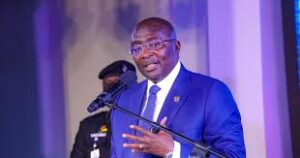GTEC Hits Back at Lawyers of Dr. Grace Ayensu-Danquah Over Unaccredited ‘Prof’ Title

The Ghana Tertiary Education Commission (GTEC) has strongly responded to legal threats issued by lawyers representing Deputy Minister of Health and Member of Parliament, Dr. Grace Ayensu-Danquah, over her continued use of the academic title “Professor.”
The dispute, which has drawn national attention, centers on whether Dr. Ayensu-Danquah rightfully holds the title of “Professor,” a rank typically conferred through a rigorous academic and institutional process. GTEC, the regulatory authority overseeing higher education in Ghana, has challenged her claim, citing discrepancies between her public statements, legal representations, and official records from the University of Utah—where she claims to have earned the title.
In an interview on Joy FM’s Midday News, GTEC Director-General, Professor Ahmed Abdulai Jinapor, publicly rejected a two-week ultimatum issued by the Deputy Minister’s legal team, demanding a retraction of the commission’s earlier position on the matter. He described the ultimatum as baseless and the legal counsel involved as counterproductive.
“We’re being asked to retract something, but it’s unclear what exactly we’re expected to withdraw,” Prof. Jinapor stated. “The facts are documented and have been verified with official sources. The legal advice she’s receiving is not only misleading but has worsened the issue.”
According to Prof. Jinapor, the controversy stems from a statement made by Dr. Ayensu-Danquah during a national television appearance in which she identified herself as a “full professor” from the Department of Surgery at the University of Utah. GTEC, seeking to verify the claim, received conflicting responses.
“Her lawyers wrote to GTEC indicating she holds the rank of assistant professor. Meanwhile, the University of Utah, in their official correspondence with us, confirmed that she is an adjunct assistant professor,” Prof. Jinapor clarified.
He explained that an adjunct assistant professorship is a non-tenured, part-time academic role, often involving limited teaching or research responsibilities. This rank does not equate to that of a full professor, which is the highest academic title within a university and typically involves years of scholarship, peer-reviewed publications, and administrative service.
GTEC maintains that this distinction is significant and that the public must not be misled by inaccurate representations of academic credentials.
Before the matter became public, GTEC reportedly made several attempts to resolve the issue privately. Prof. Jinapor revealed that the commission had offered to meet with Dr. Ayensu-Danquah in a confidential setting to clarify the situation and encourage her to desist from using the disputed title. However, she declined the opportunity.
“We extended an invitation for a private conversation with our Board Chairman at her convenience—time and place—but that meeting never happened,” he said. “Rather than take corrective action, she continued using the title.”
In light of the continued public use of the title and the subsequent legal ultimatum, GTEC has remained firm in its stance. Prof. Jinapor emphasized that the commission’s objective is not to target any individual but to uphold the integrity of academic titles and the credibility of Ghana’s tertiary education system.
“As of now, she has not provided any official documentation—such as an appointment letter—confirming her rank as a full professor, assistant professor, or otherwise,” he added.
He reiterated that academic titles must reflect verifiable appointments and should not be self-assumed or misrepresented. “Our concern is institutional. We’re defending academic standards, not engaging in personal attacks,” Prof. Jinapor stressed.
He concluded by advising public figures, especially those in positions of leadership, to ensure their academic and professional titles are used accurately and backed by appropriate credentials.






